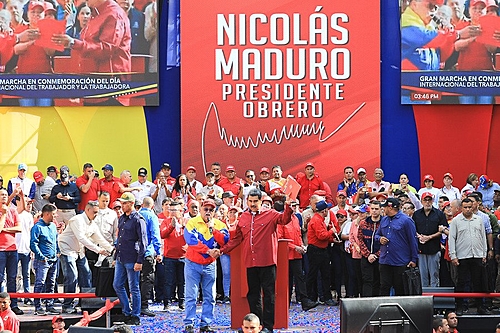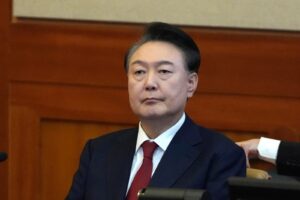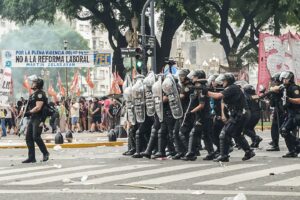
Venezuelan President Nicolás Maduro addressed thousands of supporters gathered in the center of Caracas during a political act in celebration of Labor Day this Monday (01). The expectation of the unions, popular movements and political parties present at the demonstration was that the president would announce an increase in the minimum wage.
Maduro, however, did not raise wages and, instead, decreed readjustments in workers’ food vouchers and in one of the aid paid by the government called the Economic War Bonus.
“I wish I had the resources to do more, but we are doing more with less”, said the president.
::What’s happening in Venezuela::
Since April 2022, when the government made the last readjustment, the minimum wage in Venezuela has been 130 bolivars, which today is equivalent to about US$5. When it was announced last year, the value corresponded to US$30, but constant spikes in the price of the dollar have devalued the national currency and removed the purchasing power of the millions of Venezuelans who continue to earn in bolivars.
During the act, Maduro explained that the food voucher paid to active workers (called a basket ticket in Venezuela) would be readjusted from around US$2 to US$40. reductions with possible exchange rate fluctuations.
::Colombia summit attracts US and EU, but immediate sanctions relief on Venezuela unlikely::
The changes in the Economic War Bonus – a kind of welfare grant provided by the government – underwent changes in less than 24 hours. On the platform, in front of his supporters, Maduro had said that the new aid amount would be US$ 20, also indexed to the dollar. However, in the early hours of this Tuesday (02), the president published a video on his social networks announcing “a necessary change” in the decree and changed the value to US$ 30.
With the modification, active workers registered in the government aid system will receive US$ 70 (about R$ 350) a month, with the amounts of food vouchers and the Economic War Bonus added together, in addition to their respective salaries. Despite the increases, the readjustments are below inflation and the average salary of workers in the public and private sectors is insufficient to cover the value of the basic food basket.
::Growing but threatened by inflation: what are Venezuela’s economic challenges in 2023::
“This is an emergency plan, resistance, which should lead us sooner rather than later to the recovery of wages in collective agreements, but now we have to resist with force”, he said.
Since April last year, Venezuela has sought to negotiate with employers and unions the revision of collective agreements of different categories. The initiative, called the Social Dialogue Forum, is mediated by the International Labor Organization (ILO).
marches and protests
In addition to the concentration of supporters, Caracas also received protests organized by unions not aligned with the government. Mostly from civil servant categories, the organizations demanded salary increases and an indexation plan to contain the exchange rate devaluation.
::How does the blockade relate to suspicions of corruption at Venezuela’s state-owned oil company::
Since 2018, Venezuela has been experiencing a process of forced dollarization that has practically removed the functions of a unit of account and store of value from the national currency. Despite the 2021 monetary reform having managed to gradually reinsert the bolivar into the economy, the demand for dollars remains high and the price of the US currency is constantly increasing.
Although in the first quarter of 2023 the Central Bank of Venezuela managed to maintain the exchange rate with some stability through daily interventions, the price of the dollar rose by more than 80% between May 2022 and May of this year.
Editing: Patricia de Matos
Source: www.brasildefato.com.br

